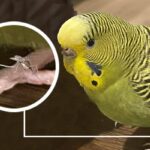Budgies like humans can get fat if they are not doing exercise. How To Tell If Your Budgie Is Overweight is the question that every responsible pet owner should wonder. It is essential to know if you have a fat budgie then you can act accordingly for his healthy life.
In this article, we will delve into the world of budgie health, focusing on how to determine if your budgie is carrying excess weight and offering tips for maintaining optimal health.
Short Answer:
Average normal weight of budgie will be around 30 – 40 gram if it is more then your budgie is overweight. Fat budgies are prone to health problems this is why it is important to keep a track of your budgie weight so you can change your budgie diet and exercise routine accordingly.
Why Is My Budgie Fat?

If you have noticed that your budgie seems to be carrying some extra weight it is natural to wonder why this might be happening.
Budgies, like any living creature can gain weight due to various factors. One common reason is an imbalance in their diet, particularly if they are consuming too many high-calorie or fatty foods.
Lack of exercise can also contribute to weight gain, as budgies need physical activity to stay fit.
In the wild, budgies spend all day flying and searching for food, if you kept your budgie in a small cage where they do not get any flying or physical activity then this will result in boredom and a fat budgie.
How Can I Tell If My Budgie Is Overweight?
An overweight budgie might exhibit signs such as reduced mobility, difficulty in flying or climbing, lethargy, and changes in posture. A budgie that appears rounder than usual without its feathers puffing out then this means it might also be carrying extra weight.
Excess Weight: Weigh your bird
If your budgie is friendly then it is better to measure by weighing daily on a weight machine. You can measure your budgie’s weight at home with a small kitchen scale.
Gently hold your budgie in your hand or on a perch and weigh both of you together. Subtract your weight from the combined weight to get your budgie weight this will help you determine their baseline weight.
If your budgie can stay still on the weighing scale then it is better to leave the budgie on the scale without the perch.

The average size of a common budgie is about 30 grams (1.1-1.4 oz), if your budgie is more than the average weight then you must change their diet and routine.

Budgie Looks Fat
One more sign to observe in budgies to confirm if they are overweight is to see their chest area which is from below the crop area. You can touch it and feel the keel bone if your budgie is not fat otherwise your cannot feel the keel bone.

Budgie Heavy Breathing
One more sign of an overweight budgie is to see how your budgie’s breathe. Fat budgies are unable to carry their weight similar to humans and this is why even a short flying may cause them to breathe heavily.
Check Budgie Feet Space
One more sign of checking if your budgie is overweight is to see the space between their feet while sitting. if it is far apart then your budgie might be fat and you need to weigh him on the scale.
How Big Of A Cage Does 1 Budgie Need?
Budgies are highly energetic birds, primarily engaging in exercise through flying. For a single budgie, It is important to note that budgies need horizontal space to fly effectively. When choosing a cage, select a cage that has elongated dimensions sideways, rather than prioritizing height over length.
This design encourages their natural flying behavior and will also save your budgie from body fat.
What Happens If A Budgie Gets Too Fat?
Obesity can cause health issues in all types of animals and birds, leading to disorders such as arthritis, fatty liver, and dangerous respiratory problems.
Cardiovascular Issue in Fat Budgies
When there is too much fat near the heart then the heart has to pump extra to move the blood around the body. Fatty stuff in the blood pipes can block the blood flow which can cause strokes or aneurysms, which are like balloon bursts in the blood vessels.
Joints
Budgies that have too much fat can put extra pressure on their joints which might make them more likely to get arthritis.
Liver
Overweight budgies have extra fat around their liver which can make them more likely to feel stressed and get sick from infections.
How To Get A Budgie To Lose Weight?
If you have confirmed from the above steps that your budgie is fat then you must be pondering over what are the next steps. There are several steps you can take to help prevent or reverse obesity.
Change In Physical Activities For Budgies Weight Lose
- Increase the cage size for more area to fly, the minimum cage size should be 18 inches in length, width, and height.
- Try to place food and water dishes opposite or put one dish higher than the other in the cage, so the bird is forced to climb or fly to each dish so the budgie can engage in exercise through flying and climbing.
- Swapping out cage toys more frequently can offer greater excitement and, as a result, more playtime.
Change In Diet For Budgies Weight Lose
- Offer a variety of nutrient-rich foods to meet your budgie’s nutritional needs.
- Fresh vegetables like leafy greens, bell peppers, cucumber and carrots should be a regular part of their diet.
- Fresh fruits like strawberries, pears, kiwis, blueberries, cherries, and melons should be a regular part of their diet as well.
- Limit seeds to a small portion and opt for pellets that are designed to meet their dietary requirements.
- When you want to transition your bird from eating seeds to pellets then it is a good idea to take it slowly. Begin by substituting 10% of their seeds with pellets in the first week, then increase to 25% in the second week, 50% in the third week, and finally 75% in the fourth week. By the fifth week, pellets should completely replace seeds.
Conclusion
Caring for your budgie’s weight is an essential aspect of their overall health. By observing signs of excess weight, offering a balanced diet, promoting physical activity, and seeking professional guidance, you can ensure a happy and healthy life for your feathered buddy.
Your budgie’s well-being is in your hands and with the right care, you can enjoy a strong bond and joyful companionship for years to come.









